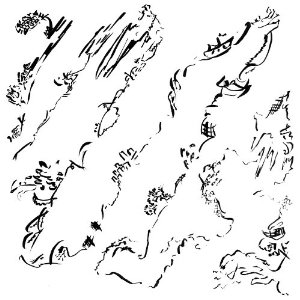There’s a joke on The Simpsons – an underrated one; hear me out here – where Marge is considering teaching piano to make some quick cash, and reasoning that her lack of ability needn’t matter as long as she can "stay one step ahead of the kid". It came briefly to mind while I listened to Valley Tangents, the fourth full album by Blues Control. Not because their piano parts are amateurish, although the cocktail-bar jazz puzzlement is imbued with a healthy whack of pub-rock crudity. No, Lea Cho and Russ Waterhouse are one step ahead of the rest of the sprawling(ly) American rock-not-rock underground in terms of which unloved dollar-bin sounds to revive. Or maybe they aren’t, and rickety fusion meandering and negative-budget kung fu movie soundtracks will remain aridly unmined. The important thing to impart is that Blues Control, by accident or design, sound like nothing you’re likely to hear this year.
The six songs on Valley Tangents don’t even sound that much like other Blues Control albums. Once upon a time, they gigged frequently in their home city of New York and were innately linked with CD-R and cassette culture circa 2003-4 – murky, inexpertly recorded crypto-psych that boasted a new age influence some way ahead of Emeralds and Dolphins Into The Future and suchlike. By 2009’s Local Flavor, their previous LP, they were practicing a disquietingly stumbling take on ambient meditation music – the equivalent of your young son bringing you a burned and jam-smeared tray of birthday breakfast. Now based in Pennsylvania, Blues Control are no longer noisy or childishly rudimentary, at least by most avant-yardsticks. Cho, on piano and keyboards, improvises with a new deftness; Waterhouse claws back a degree of rockism with thudding boogie drums and a guitar choked with the dust of its own basement.
If you were enough of a myopic, spiteful cockend that you were content to dismiss every attempt to be a bit different as "irony" or "hipsterism", you’d no doubt consign Valley Tangents‘ opener, ‘Love’s A Rondo’, to this fate. I will say that it induced surface-level reminders of James Ferraro’s 2011 oddity Far Side Virtual, but then I don’t truthfully listen to much music built around suppertime electric jazz piano. Ferraro is somewhat of a piss-taker; Blues Control come off as unblinkingly sincere, even when they’re matching this vibe up with Waterhouse’s wailing prog guitar. ‘Iron Pigs’ starts off like a mid-80s dancehall tune minus the reggae (Morricone-inside-a-Casio horns; drums reverbed to sound like gun claps) and retains the rhythm while abetting it with buttrock guitar wail, one-finger synth and all manner of FX that hits the radar like space debris. I’ve not played the Congos/Sun Araw album enough yet to say if this is better than anything on it, but I’m pretty sure it’s more mental.
‘Opium Den/Fade To Blue’ is probably the album’s sturdiest bridge between the Blues Control of then and now, inasmuch as it trundles along in a halfway Cluster-y manner – repetitive keyboard haze and shy flute parts taking lead roles. ‘Walking Robin’ has curious raindrop percussion, post-Manuel Göttsching crystal guitar, someone swiping at a harpsichord, a button-cute melodica solo and some more guitar. The least hermetic moment on the album comes with the fifty seconds of field recording – Blues Control face the outside world! – at the start of the appropriately-titled ‘Open Air’. Presently, this becomes an unlikely exercise in modern composition, plangent piano rendered insensible by unforgiving tape-mangling.
By ‘Gypsum’, the album’s final cut and a plausible attempt to cover every single base explored in its previous five, I’ve figured out who Blues Control most resemble to me – Royal Trux, specifically up to’n’including Cats And Dogs. Not to say they sound like them, and not because they’re now on Drag City (Trux’s first label) or a long-term couple, but because they’ve figured (realised) that the only appropriate way to pay tribute to all the weird, obstinate and pioneering music they’ve accumulated is to dent its panels from every available angle, with every available bit of wood and metal.


